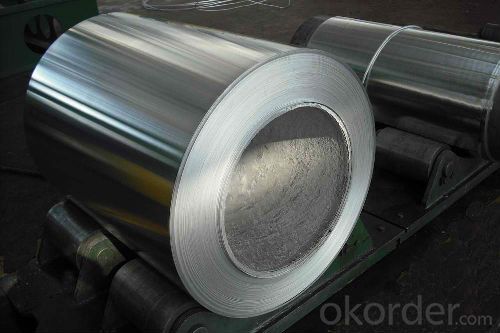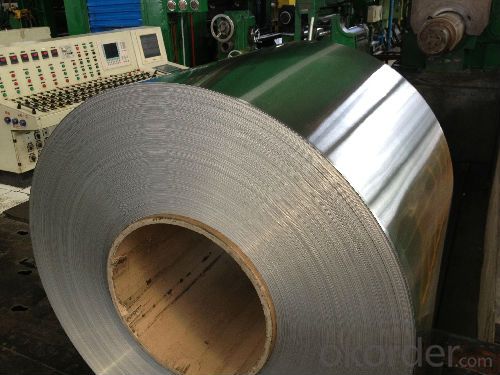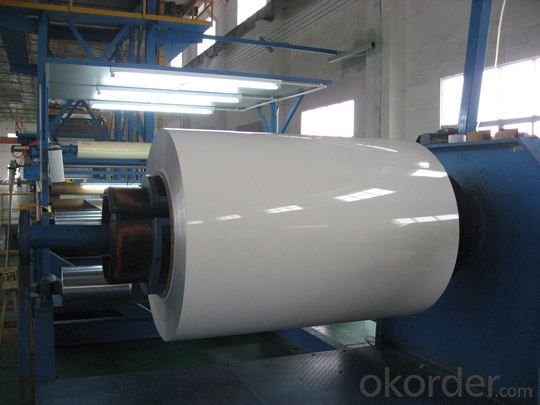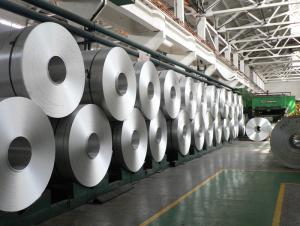Continuous Casting Aluminium Coils for Prepainted Wall Curtain
- Loading Port:
- Shanghai
- Payment Terms:
- TT or LC
- Min Order Qty:
- 5 m.t.
- Supply Capability:
- 20000 m.t./month
OKorder Service Pledge
OKorder Financial Service
You Might Also Like
1.Structure of Continuous Casting Aluminium Coils for Prepainted Wall Curtain
Continuous Casting Aluminium Coils for Prepainted Wall Curtain is one semi-finished aluminium material. This strip can be rolled down to aluminium coil,sheet,circle ect. The alloy AA1050 is widly used in building, industry ect. Its weight is much lower than steel. So many customers choosed aluminium material instead of steel.
2. Main features of Continuous Casting Aluminium Coils for Prepainted Wall Curtain
a.Competitive price---We have our own mills and can produce mill finished aluminium coils, so we can control the production cost better.
b.Professional after-sale service---We have more than 15 years exportation experience and you need not worry about the exporation problems.
c.Fast delivery time---We can control the delivery time within 35 days.
3. Image



5.FAQ: What is the quality standard?
4. Product SpecificationAlloy Temper Thickness Width Weight AA1100 H14 0.2MM-3MM 1000MM-1500MM 2 TONS
---Usually our standard is GB3880-2006
What is the largest width?
---It is 2300mm
What is the MOQ?
---Usually we can accept 80 tons.
- Q:Why does fillet appear when rolling aluminum coil?
- How thick and wide is it when there is such problem? Which is the rolling pass? And what is the type of the rolling mill? The simple 4 rollers or CVC and HC rolling mill with roller control. Does the filler appear in rolling or out of roller? Different thickness will lead to different analysis.
- Q:What are aluminum coils used for?
- Aluminum coils are commonly used in various industries, such as construction, automotive, and HVAC, for their excellent thermal conductivity and corrosion resistance properties. They are primarily used for manufacturing heat exchangers, air conditioning systems, refrigeration units, and other heat transfer applications.
- Q:What are the properties of aluminum coils?
- Aluminum coils possess several key properties that make them highly sought after in various industries. Firstly, aluminum coils have a high strength-to-weight ratio, meaning they are lightweight yet durable. This characteristic makes them ideal for applications where weight reduction is crucial, such as in the aerospace industry. Additionally, aluminum coils exhibit excellent corrosion resistance. The formation of a thin, protective oxide layer on the surface of the metal helps prevent further oxidation, making them suitable for outdoor and marine environments. This corrosion resistance also translates to a longer lifespan, reducing maintenance requirements and costs. Another important property of aluminum coils is their high thermal conductivity. This feature allows for efficient heat transfer and makes them well-suited for applications in the heating, ventilation, and air conditioning (HVAC) industry. Furthermore, aluminum coils have excellent electrical conductivity, making them favorable for use in electrical and electronic components. Aluminum coils are also highly malleable and ductile, allowing for easy shaping and forming. This versatility makes them a popular choice in manufacturing processes, such as in the production of automobile parts, cans, and packaging materials. Lastly, aluminum coils are known for their recyclability. They can be easily melted down and reused without compromising their quality, making them an environmentally friendly choice. This recyclability aspect aligns with the increasing focus on sustainability and reducing the environmental impact of various industries. In summary, aluminum coils possess properties such as high strength-to-weight ratio, corrosion resistance, thermal and electrical conductivity, malleability, and recyclability. These properties make them valuable in numerous applications across various industries.
- Q:How do aluminum coils contribute to improved indoor air quality?
- Aluminum coils play a crucial role in improving indoor air quality in various ways. Firstly, these coils are commonly used in air conditioning and HVAC systems, which are designed to circulate and filter the air inside buildings. The aluminum coils in these systems help in cooling and dehumidifying the air, reducing the moisture content that can promote the growth of mold and mildew. By controlling humidity levels, aluminum coils prevent the development of allergens and pollutants that thrive in damp environments, thus enhancing indoor air quality. Moreover, aluminum coils are highly efficient heat exchangers, allowing for effective transfer of heat between the air and the cooling or heating system. This efficiency enables HVAC systems to maintain a consistent temperature throughout the building, reducing the need for excessive energy consumption. By using less energy, these systems emit fewer harmful greenhouse gases, ultimately contributing to lower levels of outdoor air pollution and improving the overall air quality. Additionally, aluminum coils are durable and resistant to corrosion, which is essential for maintaining a clean and healthy indoor environment. The corrosion-resistant properties of aluminum coils ensure that there are no metallic particles or rust that can contaminate the air being circulated. As a result, occupants are less likely to inhale harmful particles that can cause respiratory issues and other health problems. Furthermore, aluminum coils are lightweight and often come with a protective coating, making them easier to clean and maintain. Regular cleaning of coils prevents the accumulation of dust, dirt, and other pollutants that may accumulate over time. By keeping the coils clean, the airflow is optimized, ensuring that the air being circulated is free from contaminants and allergens, thus promoting improved indoor air quality. In summary, aluminum coils contribute to improved indoor air quality by reducing humidity levels, preventing the growth of mold and mildew, enhancing energy efficiency, minimizing the emission of greenhouse gases, and maintaining a clean and contaminant-free air circulation system. These coils are an essential component of HVAC systems that play a vital role in creating a healthier and more comfortable indoor environment for occupants.
- Q:Can aluminum coils be used for electrical connectors?
- Yes, aluminum coils can be used for electrical connectors. Aluminum is a commonly used material for electrical connectors due to its excellent conductivity, lightweight nature, and cost-effectiveness. However, it is important to note that aluminum has a lower conductivity compared to copper, so it may not be suitable for applications that require high electrical currents or low resistance connections.
- Q:Can aluminum coils be welded or joined together?
- Aluminum coils have the capability to be welded or connected together. Welding is a widely used approach for joining aluminum coils, especially in industries like automotive, aerospace, and construction. Multiple welding techniques, including TIG (tungsten inert gas) welding, MIG (metal inert gas) welding, and spot welding, can be utilized. These techniques enable the formation of robust and resilient connections between aluminum coils. Moreover, depending on the specific application needs, alternative joining methods like adhesive bonding or mechanical fastening can also be employed. By utilizing the appropriate welding or joining technique, aluminum coils can be effectively and securely joined together.
- Q:Which is better composite or aluminum, and what are some main differences between the two?
- I used the Easton Stealth Composite a few years back and it had the most pop of any bat I have ever used. I never seemed to miss the sweet spot, and I don't think it was necessarily because of MY skill.
- Q:What is an aluminum coil?
- An aluminum coil is a long, flat, and thin piece of aluminum that is typically wound into a spiral shape. It is commonly used in various industries, such as construction, automotive, and electrical, due to its excellent corrosion resistance, lightweight nature, and high conductivity. Aluminum coils are often used for manufacturing products like gutters, roofing materials, heat exchangers, and electrical components.
- Q:I've heard many times that it's unhealthy to store or cook food in aluminum, due to leaching, but will this apply to handling aluminum. Also, I heard that most aluminum is coated with a layer of something, to prevent oxidation; is this true?
- Pure soft shiny aluminum develops a thin tenacious layer of aluminum oxide that retards further oxidation (unless worn off). The outer layer of skin is dead horny matter that resists penetration by metal atoms. However, some people do develop allergies to metals and perhaps metals dissolved in sweat (acids?) may get through to live tissue. Handling aluminum may not have been proved harmful but skeptics likely will take less chances.
- Q:Are aluminum coils resistant to saltwater corrosion?
- Yes, aluminum coils are generally resistant to saltwater corrosion. Aluminum is known for its excellent corrosion resistance, especially in marine environments where saltwater exposure is common. The naturally forming oxide layer on the surface of aluminum provides a protective barrier against saltwater corrosion. This oxide layer acts as a shield, preventing direct contact between the aluminum and the corrosive saltwater. Additionally, aluminum coils can be further protected through various coating methods, such as anodizing or painting, which enhance their resistance to saltwater corrosion even further. However, it is important to note that prolonged or continuous exposure to saltwater can gradually degrade the protective oxide layer and may eventually lead to corrosion, although this process is typically slow. Regular maintenance and proper care can help extend the lifespan and performance of aluminum coils in saltwater environments.
1. Manufacturer Overview |
|
|---|---|
| Location | |
| Year Established | |
| Annual Output Value | |
| Main Markets | |
| Company Certifications | |
2. Manufacturer Certificates |
|
|---|---|
| a) Certification Name | |
| Range | |
| Reference | |
| Validity Period | |
3. Manufacturer Capability |
|
|---|---|
| a)Trade Capacity | |
| Nearest Port | |
| Export Percentage | |
| No.of Employees in Trade Department | |
| Language Spoken: | |
| b)Factory Information | |
| Factory Size: | |
| No. of Production Lines | |
| Contract Manufacturing | |
| Product Price Range | |
Send your message to us
Continuous Casting Aluminium Coils for Prepainted Wall Curtain
- Loading Port:
- Shanghai
- Payment Terms:
- TT or LC
- Min Order Qty:
- 5 m.t.
- Supply Capability:
- 20000 m.t./month
OKorder Service Pledge
OKorder Financial Service
Similar products
New products
Hot products
Related keywords






























